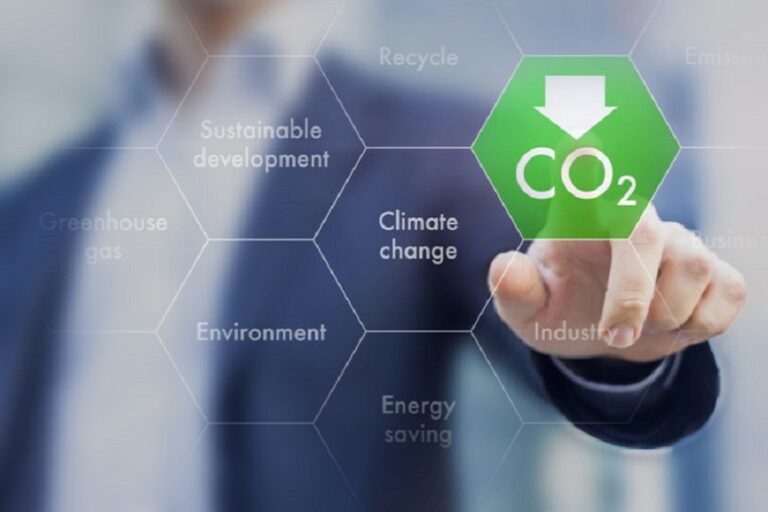The UAE Ministry of Climate Change and Environment (MoCCAE), the Industrial Innovation Group (IIG), the world’s leader in the area of security printing, biometric systems and global systems for national and corporate entities, and Venom Foundation, the first crypto foundation licensed in UAE’s ADGM , have signed Memorandum of Understanding (MoU) to establish the world’s first-of-its-kind national system for carbon credits using blockchain technology.
The collaboration aims to reduce emissions and enhance sustainable agriculture, environmental health, and biodiversity in the UAE. This will be achieved by providing the highest levels of transparency, reliability, efficiency, and security in managing the issuance, transfer, calculation, and accurate tracking of carbon credits, as well as facilitating the digitization process.
The MoU was signed by Mr. Mohammed Said Al Nuaimi, Acting Under-Secretary of MoCCAE, Mr. Taryam Matar Taryam, CEO of Industrial Innovation Group, and Mr. Peter Knez, Chair of the Foundation Council at Venom Foundation, at the Ministry’s office in Dubai, in the presence of Ms. Mariam bint Mohammed Almheiri, Minister of Climate Change and Environment.
Ms. Taryam said that “We are honored to contribute to the establishment of the UAE’s first national carbon credits registration system. The Industrial Innovation Group, with more than 30 years of experience, is committed to the UN Sustainable Development Goals and endeavors to reduce the environmental impact through decarbonization, as global climate change is closely linked to the increasing concentration of carbon dioxide in the atmosphere.”
Mr. Knez stated that “Venom Foundation has provided an unparalleled solution, acting as a key infrastructure for a global ecosystem for Web3 applications, with superfast transaction speeds and unlimited scalability to meet governments’ needs.” Knez added that the Foundation is “the first company in the UAE to develop and license its blockchain technology and shape the future of national decentralized systems and digitize operations in corporate and government enterprises”.
Four strategic objectives
The MoU aims to achieve four strategic objectives related to;
- Reducing and cutting greenhouse gas emissions to achieve climate neutrality
- Developing agribusiness
- Promoting responsible investment in agriculture and sustainable food systems
- Enhancing the economic value of the Environmental Health Program and conserving biodiversity to enhance the use of ecosystem services for sustainable development.
The main areas of cooperation between the three parties are in developing basic approaches and specific technological solutions for the project of a global platform for registering and issuing carbon credits in the UAE, within the regulatory frameworks of government decisions related to the project of the national system for issuing and registering carbon credits, and providing a blockchain-based solution for safe and effective management of the national system for issuing and registering carbon credits, and identifying and selecting projects related to reducing or removing carbon emissions.
Creating a platform for registering carbon credits
The collaboration also aims to develop a legislative and regulatory framework by MoCCAE to establish a national system for issuing and registering carbon credits. This includes creating a licensed platform and leveraging blockchain technology to ensure the safe and efficient production of carbon credit registration system documents.
The cooperation also ensures system integration to meet all requirements for establishing and developing business operations and the comprehensive process of issuing and registering carbon credits. Furthermore, it includes evaluating projects to reduce carbon emissions and remove carbon to ensure process transparency and environmental integration. This collaboration ultimately aims to contribute to achieving the UAE’s NDCs.
Areas of work
The MoU covers many areas of work, including investment in the agricultural sector, investment in innovative agrarian technologies, investment in the food industry, development of food safety practices, development of the bee-keeping sector and its products, and investment in aquaculture and fish farming.
It also includes the activation and implementation of plant and animal quarantine regulations and laws, as well as laws for the prevention of epidemics and infectious animal diseases and agricultural pests; facilitating trade, developing the country’s agricultural and animal wealth, and enhancing good agricultural and animal practices and palm sector development, promote energy efficiency, renewable energy and waste-to-energy and sound management of green technology, green cities, green buildings, green transport and other activities of sustainable cities.
It also covers the areas of improving air quality, biodiversity and environmental protection, monitoring changes in natural habitats and their threats, preserving natural reserves, and any innovation that develops sustainable development policy and food security, establishing scientific research and studies, education and training and qualification in the fields of the Ministry’s work.
Additionally, the MoU covers green investment, adaptation to climate change, reducing carbon emissions, reducing environmental pollution, preparing and implementing a climate neutrality strategy, enhancing partnership opportunities with the private sector, developing waste treatment methods, improving and developing processes and services, exchanging technical information and laws and experiences and courses and visits, applying the state’s obligations towards international agreements, such as the SPS Health and Plant Health Measures Agreement.



